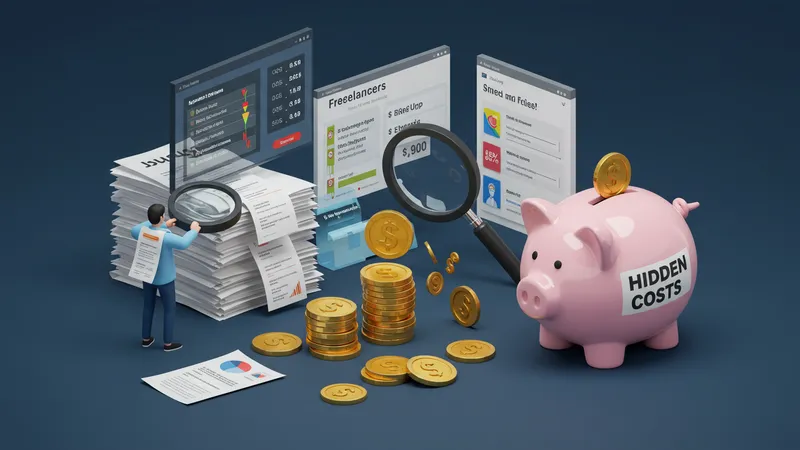

Did you know that receiving international payments as a freelancer in South Asia could be as easy as sipping your morning chai? Yes, you heard it right: an effortless, efficient process that many are still unaware of.
With remote work skyrocketing, ensuring you have the right payment system in place is more critical than ever. As a freelancer, navigating international trade is not just an option—it's a necessity for survival.

The secret world of international freelancing is not just about receiving payments; it's about mastering hidden fees and fluctuating exchange rates. Many platforms promise secure transfers but come with unrecognized costs—like 2% deductions on every transaction. You think you're getting the best deal, but here’s the kicker: some freelancers lose nearly $1,000 every year by overlooking these hidden charges.
But that's not even the wildest part. As digital currencies enter the scene, some freelancers are bypassing traditional banks altogether, opting instead for crypto payments. Imagine, a world where your client's payment arrives in Bitcoin, instantly converting to your local currency without the usual hassles of high keeps. But is crypto really the future for every freelancer out there?
What happens next shocked even the experts. As surprising new strategies emerge, it’s time you discovered how some South Asian freelancers are completely reimagining their approach to global payments. Could you be missing out on the revolution?
Hidden fees can often be the bane of freelance workers trying to receive payments from foreign clients. Payment platforms often advertise free or low-fee structures, yet find ways to chip away at your hard-earned money. Exchange rate markups, transfer fees, and even annual maintenance fees are sneaky culprits that catch many freelancers off guard.

According to industry insights, some freelancers unknowingly lose between 3% to 5% on conversions due to these hidden costs. This might sound trivial until you calculate it over a year—imagine losing hundreds on every $10,000 earned! The truth is, being vigilant about service charges and restructuring your payment strategies can save you substantial amounts.
That's where new-age financial literacy comes into play. Being informative about these fees allows freelancers to minimize overheads and maximize profits. While financial analysts emphasize the need for literacy, how many actually follow through? The answer might surprise you.
But there's one more twist. By constantly re-evaluating the payment platforms you use and keeping abreast of recent changes, you can make informed decisions and optimize your earning potential. What you read next might change how you see this forever.
Digital wallets have leaped forward as a viable solution for international payments, especially in South Asia. While traditional bank transfers are often slow and cumbersome, digital wallets offer an real-time alternative. With the likes of Venmo and PayPal, money can flow seamlessly without unnecessary delays.

However, it's important to note that these digital solutions come with their own set of challenges. Security becomes a significant concern when your earnings are just a few clicks away. Cybersecurity breaches can jeopardize your hard-earned cash, which is why it’s crucial to opt for trusted providers and enable two-factor authentication.
Successful freelancers make it a point to exploit these digital advances effectively, often diversifying their payment options to hedge against issues with any one provider. The balance involves being tech-savvy while remaining vigilant against threats.
Yet, the narrative doesn’t stop there. The digital wallet market is still evolving rapidly; staying informed can provide you competitive advantage. What's shifting on the horizon could redefine digital financial transactions forever.
Cryptocurrencies have swooped in as both an alternative and a disruptor in the payments landscape. For freelancers, Bitcoin and Ethereum act as potential tax savings strategies and instant payment solutions. Why? Because they evade the typical banking routes, sidestepping transaction fees and delays.

We've now reached a point where Bitcoin ATM locations are sprouting across South Asian cities, making it easier for freelancers to cash out their digital assets. The real kicker here is that some have reported doubling their income simply by receiving payments in cryptocurrency and leveraging market trends to their advantage.
However, the unpredictability of crypto markets brings risks that should not be overlooked. Without proper timing and know-how, freelancers could end up losing a substantial portion of their earnings. Smart freelancing means understanding both the benefits and the intricacies of this payment medium.
The future holds untold potential for cryptocurrency in facilitating international payments. The evolving guidelines and innovations could challenge everything you think you know about currency trading. Will you adapt to this modern age, or risk getting left behind?
Blockchains, though often associated with cryptocurrencies, have broader applications that are revolutionizing international payments. For freelancers, blockchain technology promises transparency and reduced intermediary costs, leading to more pocketed income.

The implementation of blockchain technology in financial processes keeps a secure ledger of transactions, eliminating the need for a third party. This technological advancement can reduce the risk of fraud—a significant issue for freelancers—and ensure faster payments.
Financial analysts have noted that blockchain innovation could cut costs by up to 40% in international money transfers. Imagine maintaining more control over your contracting business by empowering yourself with this technology.
These developments affect not just payments but could also free freelancers from the bureaucratic labyrinth that often cripples creative endeavors. Are you ready for a payment landscape without middlemen? Change is undeniable, and its impact might be far-reaching.
Many South Asian freelancers are discovering the perks of using offshore accounts to facilitate international transactions. While local banks often come with hassles like lower foreign currency reserves, offshore banks provide a more accommodating solution.

Interestingly, offshore accounts can offer lower tax exposure and allow easier access to foreign currencies, putting freelancers at an advantageous position when negotiating international contracts. But it’s not just about the financial perks; psychological comfort plays a huge role as well.
Firms have noticed an increased optimism among freelancers who leverage offshore accounts, as they feel more in control of their financial security and capability to adapt to global economic fluctuations. Freedom, after all, is not just financial—it's mental.
The introduction of such banking options is a paradigm shift that opens gateways to unprecedented opportunities. As cross-bordered banking arrangements become more mainstream, how will you position yourself to harness these possibilities?
The digital transformation in financial services has reshaped how freelancers perceive money. Live digital currencies and app-based solutions offer real-time monitoring and an unprecedented level of transparency. The era where bank managers dictated terms is phasing out.

Today, freelancers in South Asia can track an international payment from start to finish through mobile applications. This increased control means they can lock better exchange rates and optimize their strategies, leading to greater profitability.
Innovative apps also offer personal finance management tools, enabling freelancers to budget effectively and gain insights into income patterns. These tools are crafted to address 21st-century financial challenges facing freelancers.
As you embrace these technological leaps, remember that being tech-literate yields higher returns in this landscape. With constant innovation in fintech, will you ride the wave of progress, or risk being left in the digital dust?
No discussion on receiving international payments is complete without focusing on tax implications. South Asian freelancers face unique challenges with tax laws often not keeping up with digital globalization.

Many freelancers fall into the trap of underestimating tax liabilities, forgetting that global earnings have local tax consequences. Failing to adhere to regional requirements can lead to financial penalties that far outweigh tax savings from lesser-known loopholes.
Careful planning with professional advice can navigate these murky waters. Keeping abreast of fiscal policies and utilizing double taxation treaties can ease financial burdens, yet many remain unaware of their benefits.
Are you equipped with the knowledge to manage these implications effectively? There’s a growing trend towards simplifying taxation for digital nomads—will you be a part of shaping this revolution?
The gig economy, driven by technological shifts, has made freelancing a core economic component, especially in South Asia. The sheer scale of this change affects not just individual freelancers but entire economies.

Data shows freelancing contributes significantly to GDP growth within emerging markets, where workers are increasingly freeing themselves from traditional employment constraints. An understanding of these economic shifts positions freelancers to better prepare and participate in the global market.
The economic implications extend beyond financial independence. They influence policy changes and contribute to geopolitical impacts as freelancers wield their collective economic power.
As the landscape rapidly changes, your adaptability determines your success. The economy evolves, but question is: how will you capitalize on these shifts to advance your freelancing journey? The time for action has arrived.
Freelancer platforms have evolved in response to growing demand, transforming from basic job boards to comprehensive ecosystems. These platforms now offer integrated payment solutions aimed at bridging international gaps.

Outsourcing giants like Upwork and Fiverr have adopted fintech advancements, offering escrow services to protect payments. They also provide leverage with automatic tax calculations and compliance checks.
Such advancements mean freelancers can focus on productivity without worrying about payment disputes or tax documentation. Platforms offer more structured support and smarter financial management, proving invaluable to freelancers who aim to streamline operations.
But here's the twist—it begs the question: will you keep pace, leveraging technology to its fullest, or will you find yourself playing catch-up in this rapidly evolving marketplace? Navigate this evolution or risk obsolescence. Where will you stand?
In a world where freelancing can sometimes feel isolating, South Asian freelancers benefit from vibrant online communities. These groups offer advice, share platforms, and divulge payment hacks to smoothen the freelancer's path.

Realizing the power of collective wisdom, freelancers find forums, social media groups, and local meetups to be a goldmine of information. A crucial part of freelancing success hinges on aligning with the right community.
There’s immense value in speaking with those who understand your challenges, from decoding payment platforms to tax queries. Such networks can sometimes offer invaluable opportunities that commercial channels may overlook.
As you expand your horizons, ask yourself if you're making the most of these supportive avenues. The essence of community in freelancing isn't just collaboration—it's fostering resilience. Are you part of a thriving ecosystem?
Fintech innovations have brought staggering changes to how freelancers receive payments. Introducing AI-driven analytics and blockchain integration, financial technology has modernized traditional practices, putting power in the freelancer's hands.

Artificial intelligence automates invoice creation and payment follow-ups, minimizing errors and streamlining operations. Embracing fintech means freelancers enjoy better financial oversight with less administrative burden.
Blockchain integration adds security to transactions, providing unparalleled transparency. These technologies afford freelancers control over their financial ecosystems, enabling them to build more robust business models.
Standing at the intersection of innovation and finance, will you adapt these advances? Embracing these changes isn’t just about being progressive—it's about sustainability in an ever-evolving marketplace.
Freelancers often grapple with ethical dilemmas when determining payment modalities, especially since international remittances present a myriad of grey areas. Ethical considerations encompass fair practice, transparency, and responsible reporting.

Concerns arise around ensuring fair trade and honest representation of services offered. In a decentralized environment, maintaining ethical integrity is crucial to nurturing professional reputation and trust.
Transitioning to ethical payment solutions that prioritize transparency can enhance credibility, a pivotal factor in long-term success. Proactive measures to ensure clean transactions can mitigate legal and reputational risks.
As freelancers explore diverse payment methods, how will they ethically align themselves with sustainable practices? Balancing innovation with integrity is paramount for thriving in this digital age.
The way freelancers receive payments can significantly impact their psychological well-being. Timely and efficient payments encourage productivity and satisfaction, while delays or unexpected fees foster stress and dissatisfaction.

Efficiency in payment processes boosts confidence and reflects positively on work relationships, incentivizing freelancers to maintain high performance. Understanding the psychological nuances of financial transactions can significantly enhance work-life balance.
The reverse is equally impactful. Frustrations arising from opaque policies and undesirable fees can deter focus and productivity, highlighting the emotional rollercoaster that payment systems can trigger.
As freelancers explore payment platforms, considering emotional consequences becomes increasingly essential. Will your financial choices uplift you or create undue burden? As you navigate this terrain, choose with your overall well-being in mind.
The global economic landscape heavily influences how South Asian freelancers operate. The shifts in financial power dynamics, currency fluctuations, and trade tariffs play roles in how freelancers strategize payments.

Keeping an eye on economic forecasts allows freelancers to remain agile and responsive. From currency hedges to adapting services to economic climates, understanding global trends equips freelancers with competitive edges.
Economic volatility is both a challenge and opportunity for enterprising individuals. The nimbleness required amidst political and economic changes incentivizes freelancers to build diversified streams of income.
Your financial acumen can significantly affect your freelancing path. Will you embrace economic trends as opportunities for growth? Adapting to global landscapes could mark the difference between merely surviving and thriving.
As you navigate the ever-shifting landscape of international payment solutions, one thing becomes crystal clear: adaptation is the ultimate key to success for South Asian freelancers. Embrace these changes, and the possibilities will be limitless. Thrive by continuously evolving—your freelancing future depends on it.
Share your payment journey with others, bookmark innovative solutions, and dive deep into the world of secure transactions. Because, truly mastering international payments is not just a skill—it’s your gateway to the boundless opportunities of global freelancing.